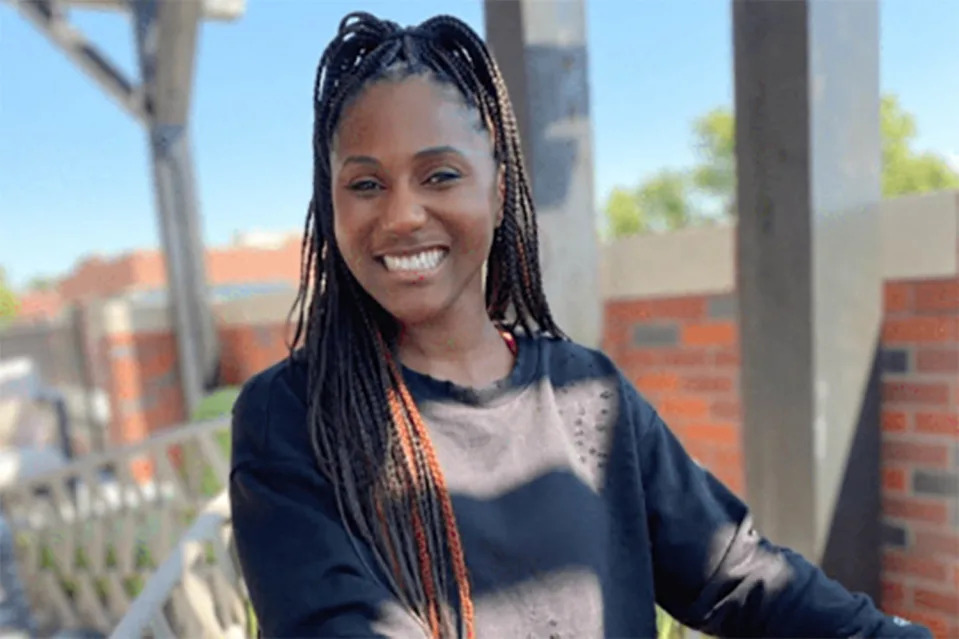You see..... you just never know ....does not matter how fit you are .....yoga/cheerleader.......death ....... does not discriminate on any level .......and women die going forward to give life ......something transgender should think about and will never understand ....... but they cannot because they are men .....simple ........simple .....dolly dimple ........condolences to this beautiful women ....... for sacrificing all her life ....... to there is no more braver act of life ...... than a women dying giving birth........ ............
Longtime Kansas City Chiefs cheerleader Krystal Anderson dies after giving birth
Krystal “Krissy” Anderson, a former Kansas City Chiefs cheerleader and yoga instructor, has died at 40.
The official Chiefs Cheer Instagram confirmed her death and expressed condolences while paying tribute to Anderson. An obituary also shared that Anderson died “unexpectedly” on March 20, “shortly after the birth of her daughter, Charlotte Willow Anderson, who was born at rest.”
“We are deeply saddened by the recent passing of CC alum Krystal. Krissy cheered with us for over 100 games from 2006-2011 and 2013-2016,” the statement began. “During that time, she attended the Pro Bowl as the Chiefs representative in 2015, served as a captain of her team, cheered during the London game, and visited our troops around the world, including in Iraq, Kuwait, and throughout the United States.”
The Chiefs Cheer statement added that Anderson “was loved and adored by her teammates, fans, and strangers who were never strangers for long.”
“After her time as a cheerleader, she continued to share her love of dance and Chiefs Cheer by serving in an alumni role on game day, practices, and at events,” the statement continued. “We will miss her kind spirit, joyful energy, and her sparkle. Our thoughts and prayers are with her family and loved ones. We will cherish every moment we had with her. At a later date, we will share how we will continue to honor her legacy.”
Tavia Hunt, wife of Chiefs chairman and CEO Clark Hunt, commented on the post, writing, “A profound loss for our team, organization, and anyone who ever crossed her path. We love & miss you Krissy. Hug Lamar & Norma for us.”
Anderson was also a software engineer, according to her obituary, “making significant contributions to improving healthcare, including being awarded a patent for developing software that assesses the risk of post-partum hemorrhage.”
She is survived by her husband, Clayton Anderson, whom she married in July 2021, parents Bertha and Burnette Johnson, brother Corey Johnson and several other family members.
Her obituary also notes that she was preceded in death by her infant son, James Charles.
In an interview with Kansas City Fox affiliate WDAF, Clayton Anderson said that his wife spiked a fever after their daughter was stillborn. He said that she battled sepsis, which led to organ failure and three surgeries.
“I feel lost,” Clayton Anderson said. “There’s a lot of people in this house and it feels empty.”
Sepsis is when the body responds improperly to an infection, causing the organs to work poorly, according to Mayo Clinic. Sepsis may progress to septic shock, with blood pressure dropping and damaging never organs that can lead to death.
Black maternal mortality rates have long been high in the United States. Black women are nearly three times more likely to die during childbirth than white women, according to the Centers for Disease Control and Prevention.
In February, Dr. Jessica Shepherd, an OB-GYN at Sanctum Med + Wellness in Dallas, said that to reduce the Black maternal mortality rate, “There needs to be a fundamental change in the actual foundation of health care systems. That would be (addressing) insurance coverage, that would be (increasing) access to resources and tertiary care hospitals or systems that are in food desserts, underprivileged areas.”
Additionally, OB-GYN Dr. Chavone Momon-Nelson said studies show that people who are treated by doctors who look like themselves have better outcomes.
“Black physicians make up about 5-6% of all physicians. Black female physicians make up 2% of all physicians,” she said. “If you only have 2-5% of people who look like you (as doctors), the likelihood that someone would be cared for by somebody who is Black is very low.”
This article was originally published on NBCNews.com


No comments:
Post a Comment